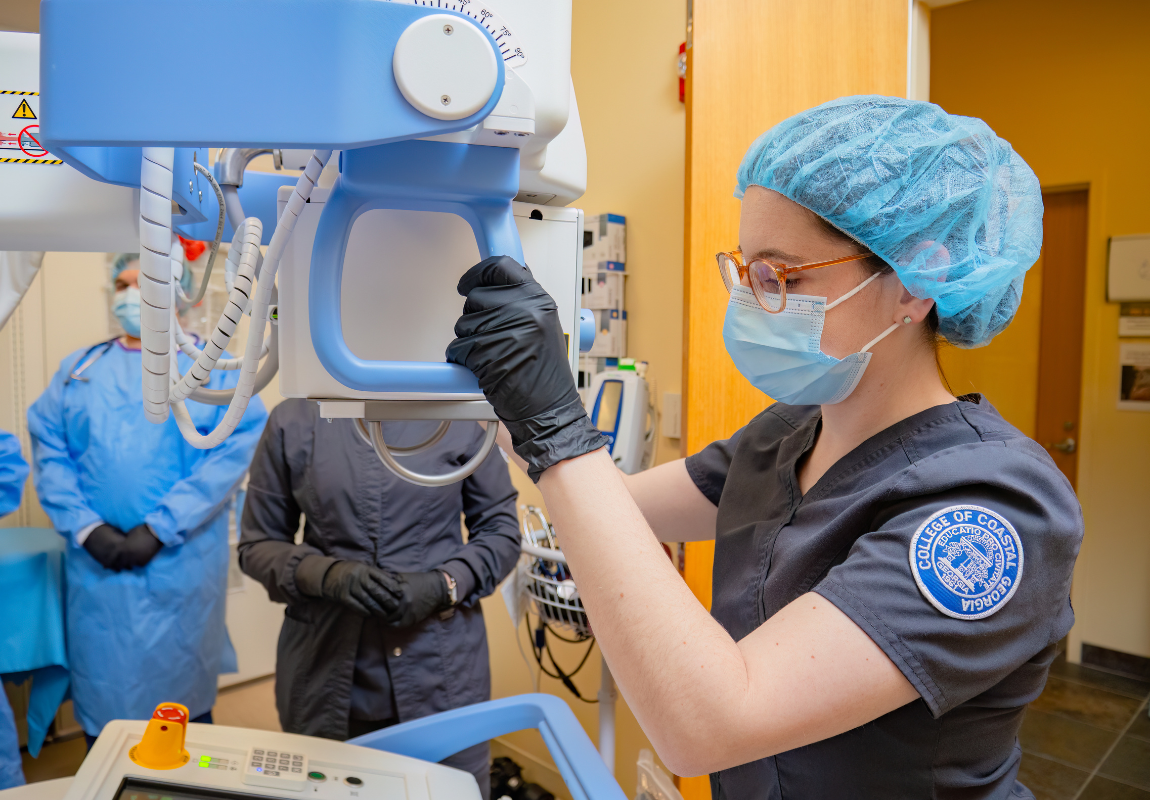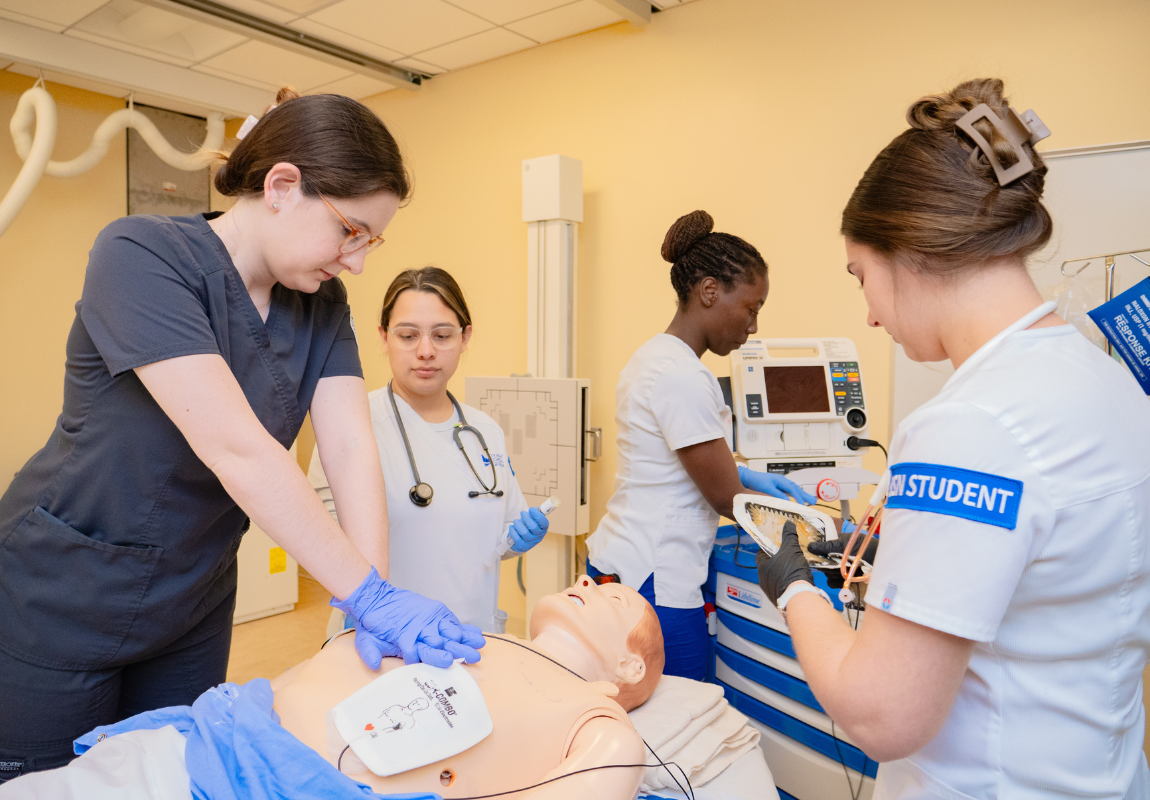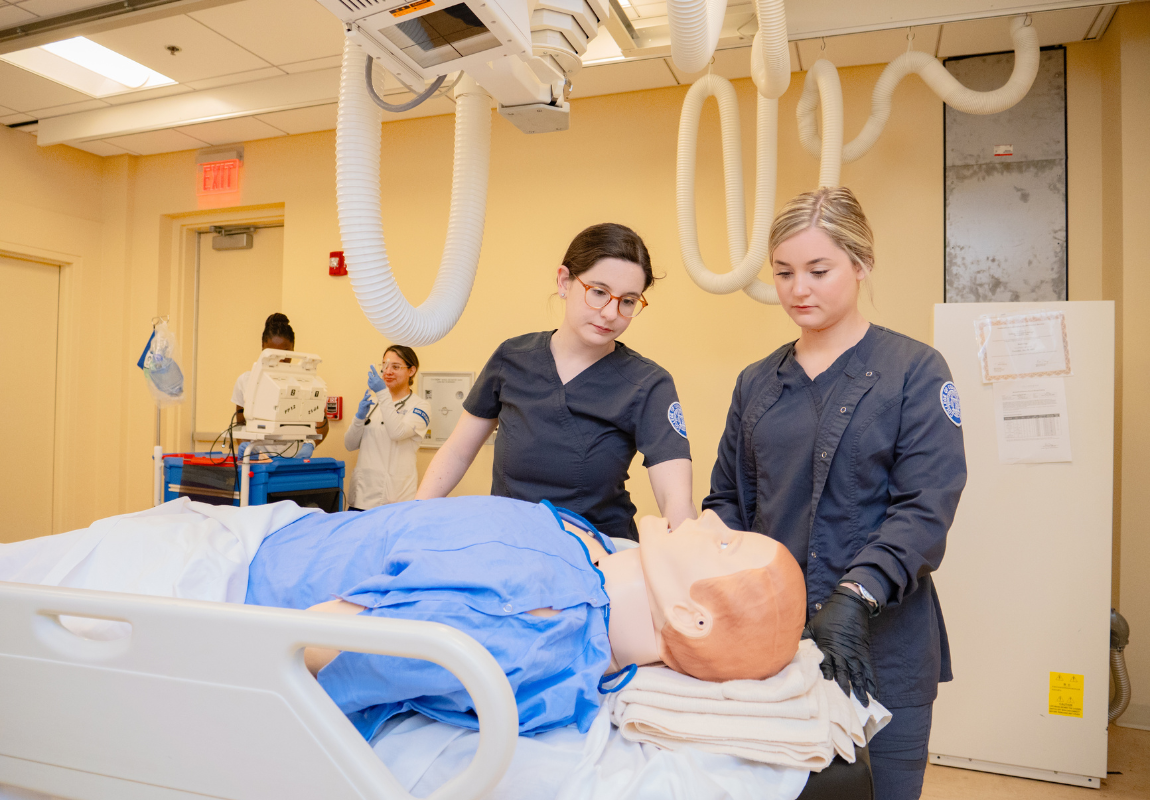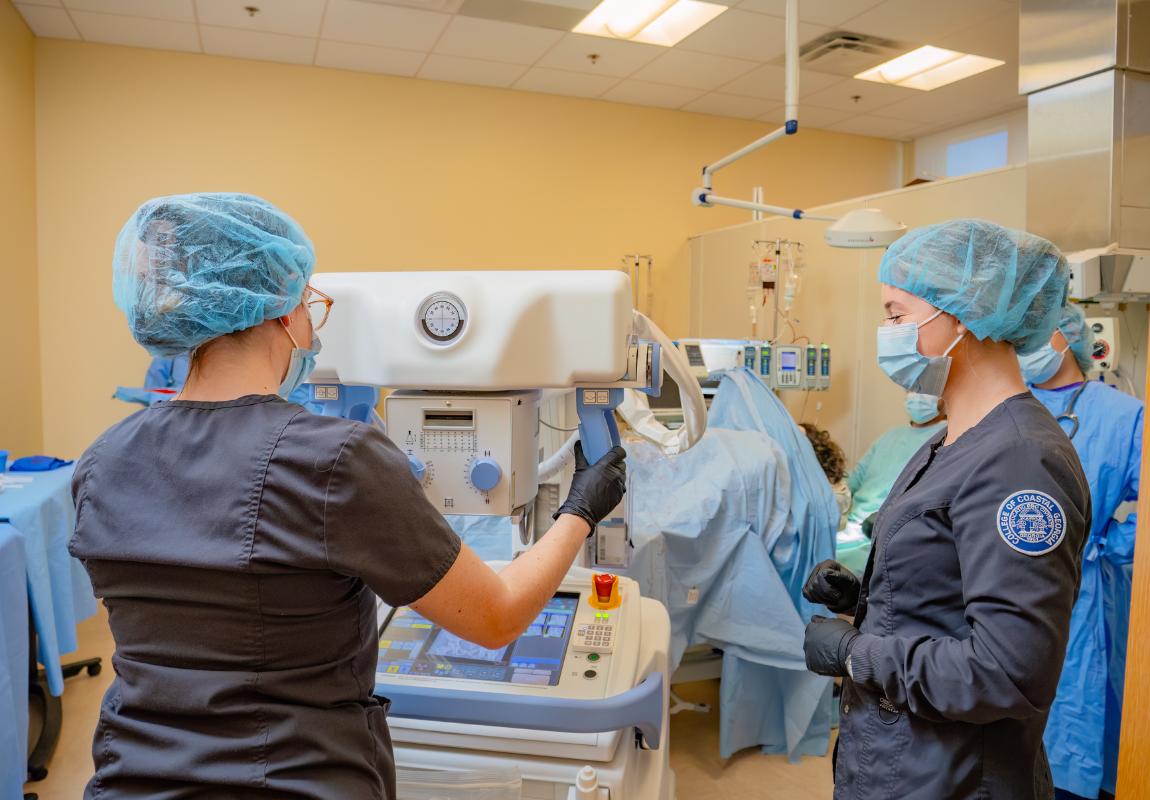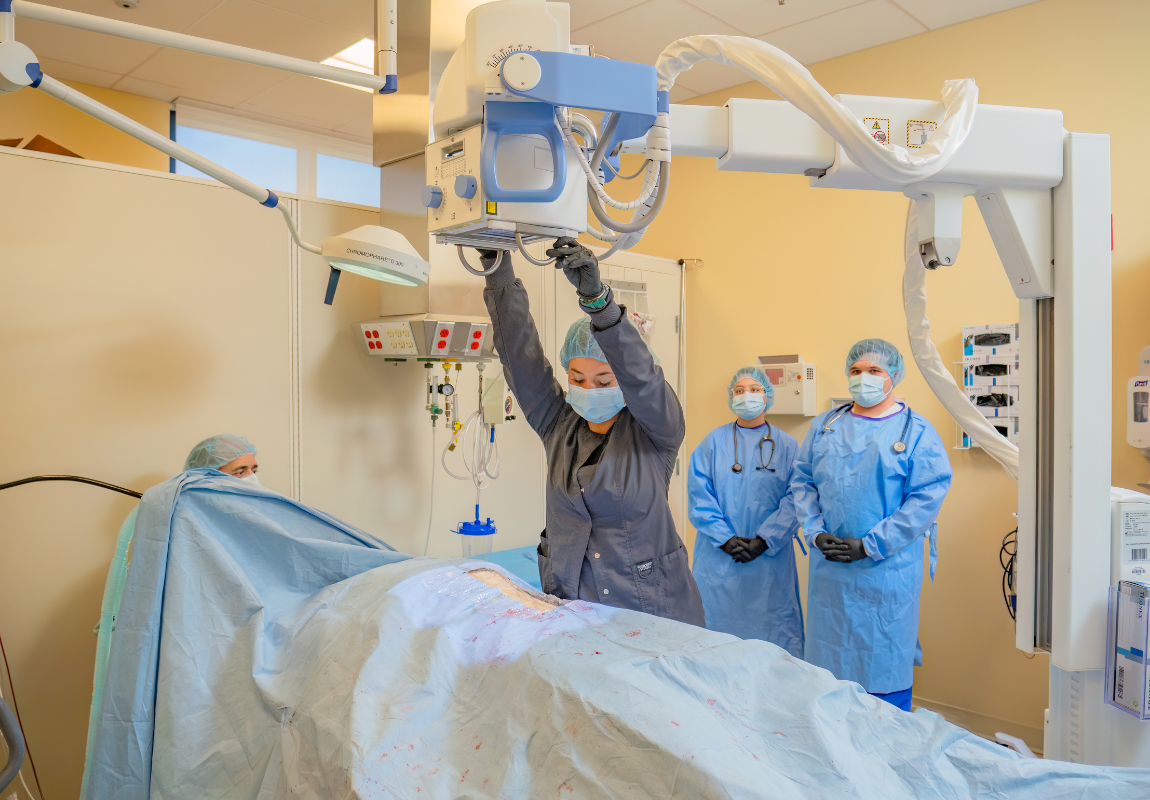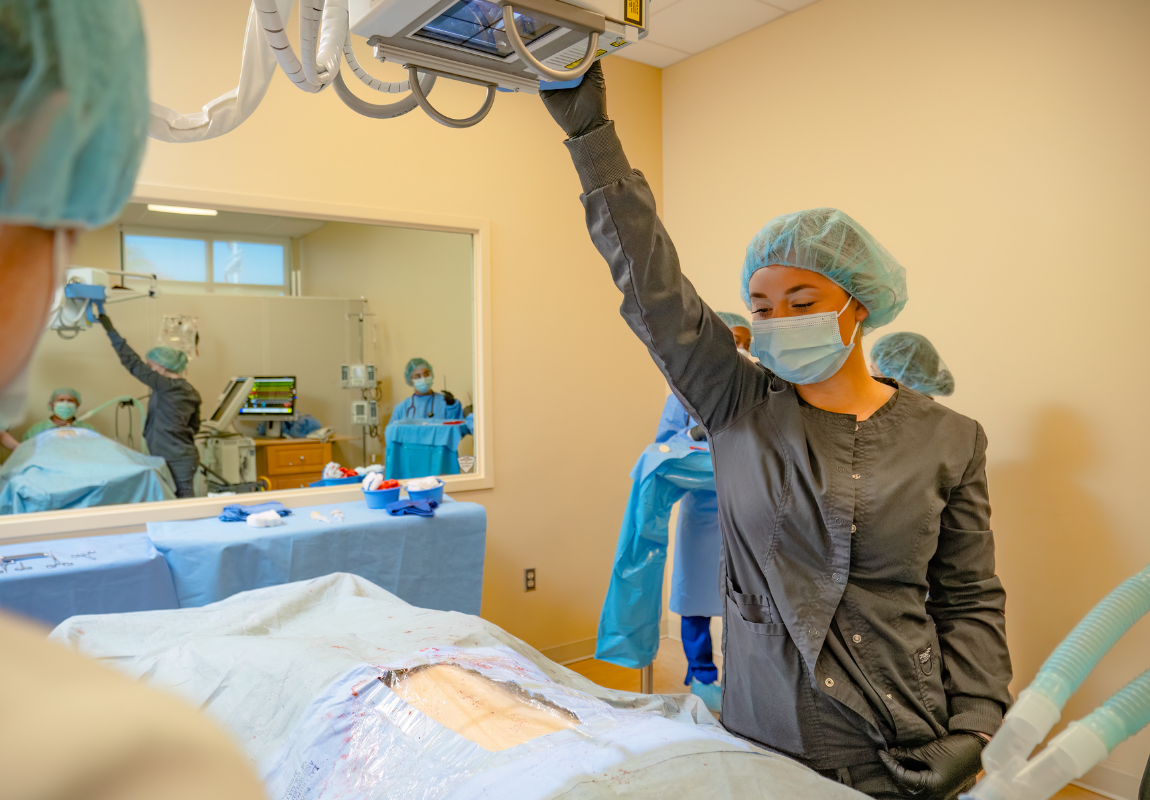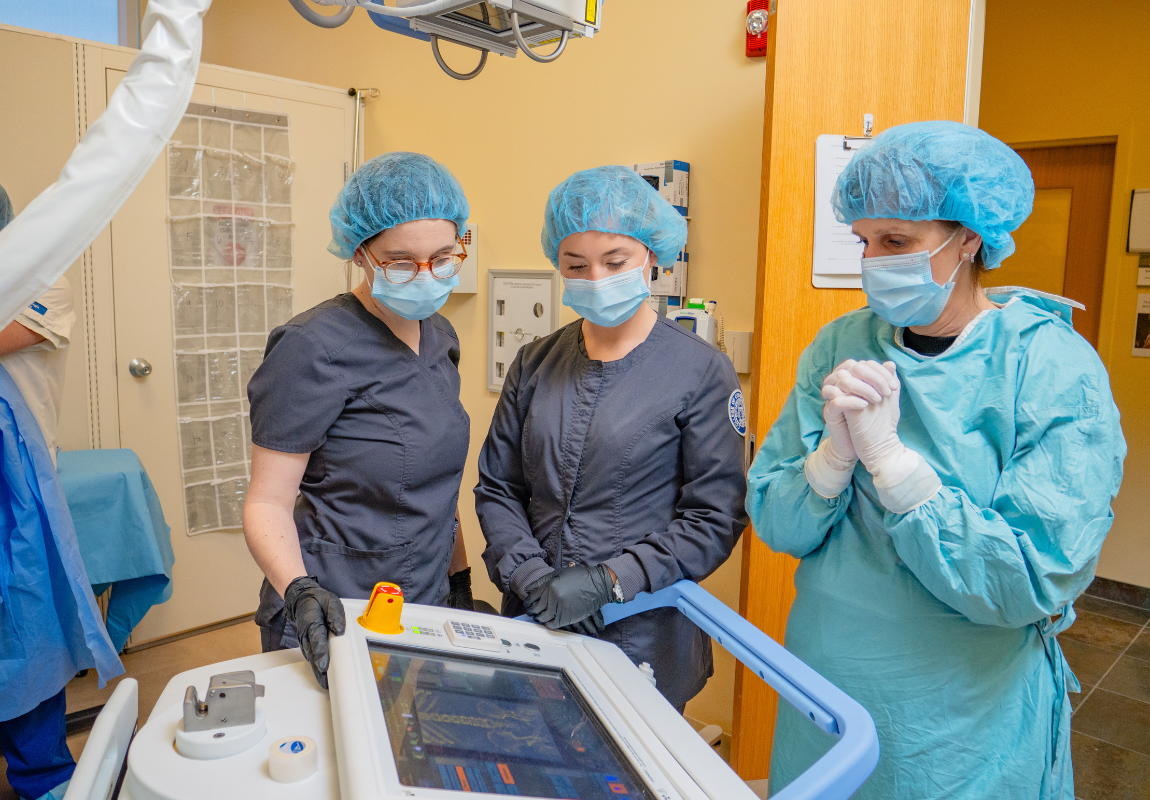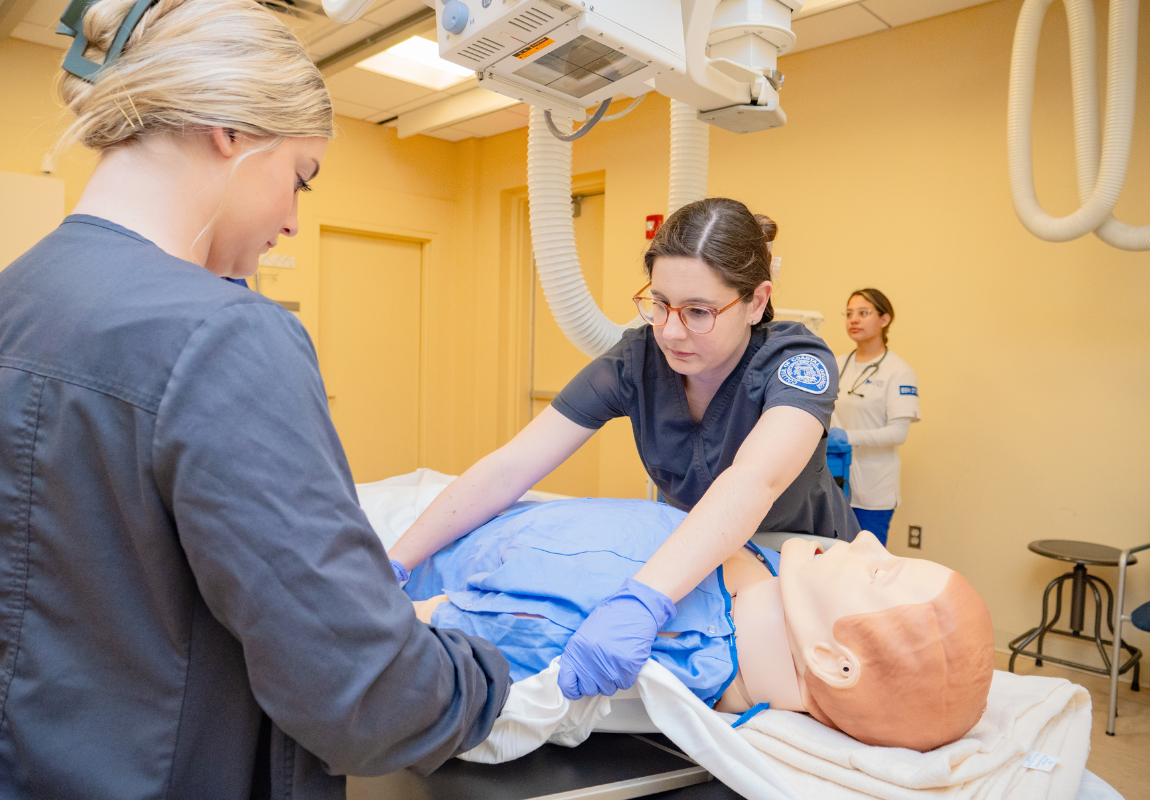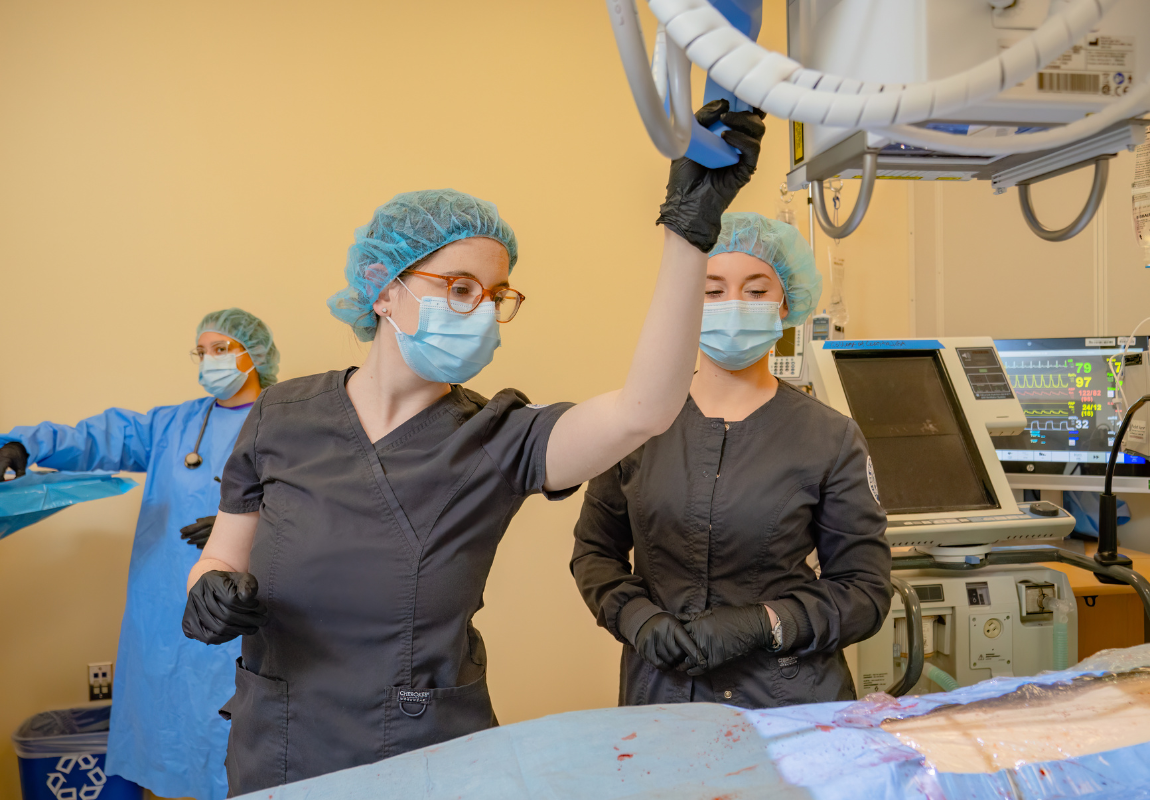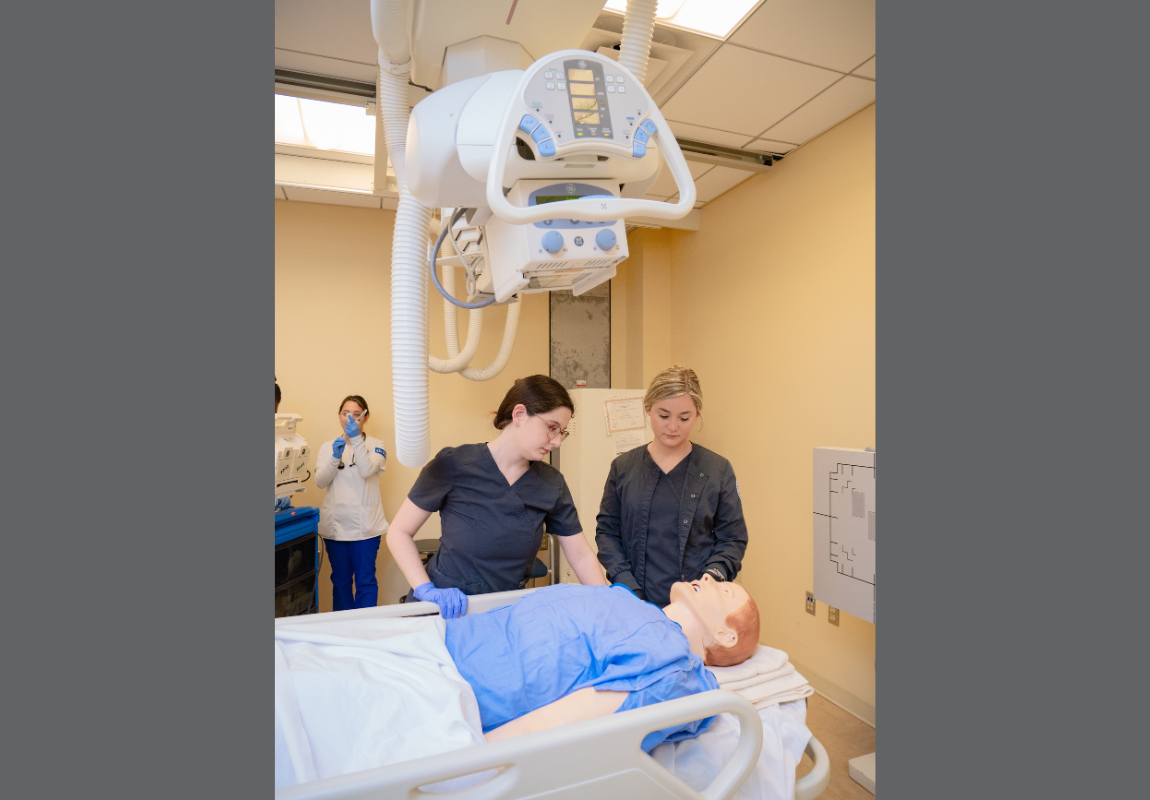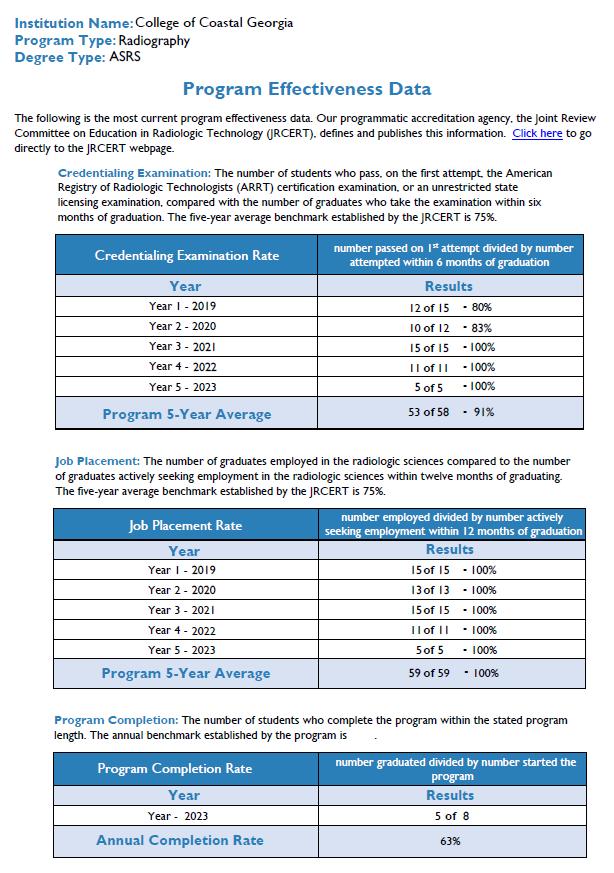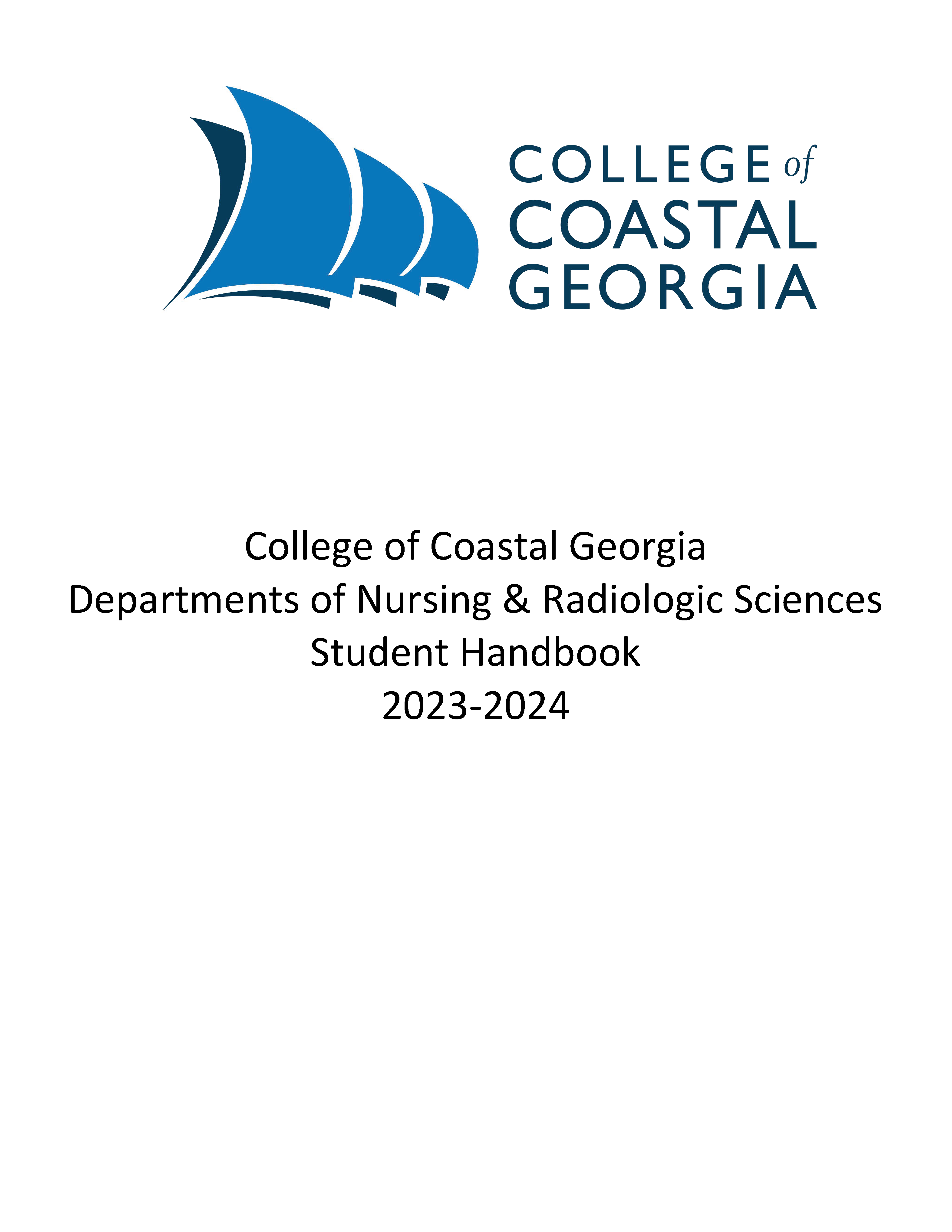- Home
- Academics
- School of Nursing and Health Sciences
- Radiologic Science
Radiologic Science
*Application deadline for Fall 2025 is April 15. Please apply on the myCCGA portal.
The Radiologic Science field is growing rapidly, with a rising need for skilled professionals in hospitals, clinics, imaging centers, and other healthcare settings. By obtaining this degree at Coastal Georgia, you will enter a field with excellent job prospects and long-term job security.
Why Coastal?
- Coastal Georgia is ranked one of Georgia’s most affordable colleges
- Complete program in only four semesters (after completing core classes) and graduate in December.
- High quality radiology simulations in addition to simulations with nursing students that imitate & prepare students for real-world experiences
- Clinical partners across five counties, including orthopedic offices, outpatient centers, hospitals, level 1 trauma center, & a children’s hospital
- State-of-the-art hospital-grade equipment
Program Success
- 100% first attempt ARRT registry pass rate for years 2021, 2022, 2023, and 2024
- 92% five-year first-time pass rate
- 100% job placement rate within three months of graduation, annually
- Achieved JRCERT – (Joint Review Committee on Education of Radiologic Technology Accreditation).
- Continued accreditation for eight years (the highest award)
Get Started!
Step 1: Apply and be accepted to the College of Coastal Georgia.
Step 2: Complete and submit the Radiologic Science application before the deadline. Applicants must have an overall GPA of 2.5 or higher. In the portal, click on “Student Forms,” then “program application forms.”
Step 3: Successfully complete the HESI A2 exam. Applicants should score a 75% or higher in each section of the exam.
Applicants Must:
- Complete the College of Coastal Georgia Admissions process. You must be officially accepted to the College before you can apply to the Radiologic Science Program. Apply to the College here.
- Complete the Radiologic Science application here. Submit all required documents online as instructed.
- Take the required HESI A2 Admission Assessment exam and submit results with application. Applicants must achieve a score of 75% or higher on each of the four sections on the assessment. The individual parts are Math, Reading Comprehension, Vocabulary and General Knowledge, and Anatomy and Physiology. Applicants must also take the Critical Thinking section of the HESI A2 assessment, although the results from this section will not be used during the decision regarding acceptance to the program. Applicants may not have more than two attempts on the HESI A2 exam (minimum of 30 days between tests). Achieving the 75% on the HESI A2 does NOT guarantee admission to the Radiologic Science Program. HESI A2 scores are valid for up to three years following testing. A student has two attempts to achieve the required score for each of the four sections of the exam. The admission committee will accept the highest score for each section.
- Have a minimum grade of C in all required core courses.
- Have a minimum of a 2.5 overall grade point average (GPA).
- If the student has ever received a D or F in a radiology course in any radiology program, they will be evaluated on an individual basis by the Radiologic Science Admission and Progression Committee. If a student has received a D or F in two or more radiology courses, they are not eligible for admission to the Radiologic Science Program.
- Meet/perform the Core Performance Standards as listed below:
- Critical Thinking – Critical thinking ability sufficient for rapid clinical judgement and decision-making
- Interpersonal – Interpersonal abilities sufficient for interaction with individuals, families and groups, from various social, emotional, cultural, and intellectual backgrounds
- Communication in English – Communications abilities sufficient for verbal and written interaction with others to include note-taking abilities and the ability to rapidly interpret and disseminate information
- Mobility – Physical abilities sufficient for movement from room to room and in small spaces
- Motor Skills – Gross and fine motor abilities sufficient for providing safe, effective patient care
- Hearing – Auditory ability sufficient for monitoring and assessing health needs
- Visual – Visual ability sufficient for observation and assessment necessary while patient is in your care
- Tactile – Tactile ability sufficient for physical assessment and radiographic positioning
Applicants to the Radiologic Science Program at Coastal Georgia should be aware that all courses within the didactic and clinical curriculum are required. The Radiologic Science Program does not currently have an advanced placement track.
Radiologic Science Mission:
The mission of the Radiologic Science Program at the College of Coastal Georgia is to provide the community with clinically competent radiographers focused on providing high quality patient care and radiation protection. Students will be prepared to function as part of a dynamic healthcare team, assume roles of leadership, and engage in lifelong learning.
Program Goals:
The Associate of Science in Radiologic Science student/graduate will be prepared to:
- demonstrate critical thinking and problem solving
- demonstrate clinical competence
- demonstrate effective communication skills
- evaluate the importance of professional growth and development
Student Learning Outcomes:
Goal 1: Radiologic Science students will demonstrate critical thinking and problem solving skills.
- SLO 1: Students will manipulate technical factors for non-routine examinations.
- SLO 2: Students will be able to adapt positioning for trauma patients.
Goal 2: Radiologic Science students will be clinically competent.
- SLO 1: Students will apply positioning skills.
- SLO 2: Students will select appropriate technical factors.
- SLO 3: Students will practice radiation protection.
Goal 3: Radiologic Science students will be able to communicate.
- SLO 1: Students will demonstrate oral communication skills.
- SLO 2: Students will practice written communication skills.
Goal 4: Radiologic Science students will evaluate the importance of professional growth and development.
- SLO 1: Students will determine the importance of continued professional development.
- SLO 2: Students will summarize their professional obligations upon gaining their ARRT credentials.
The Radiologic Science Program at the College of Coastal Georgia is accredited by the Joint Review Committee on Education in Radiologic Science (JRCERT). It currently holds an eight-year accreditation status.
The Joint Review Committee on Education in Radiologic Technology (JRCERT) promotes excellence in education and elevates the quality and safety of patient care through the accreditation of educational programs in radiography, radiation therapy, magnetic resonance, and medical dosimetry. Students have the right to submit allegations against a JRCERT program if there is a reason to believe that the program has acted contrary to JRCERT accreditation standards, or that conditions of the program appear to jeopardize the quality of instruction or the general welfare of its students.
Contact of the JRCERT should not be a step in the formal institutional/program grievance procedure. The individual must first attempt to resolve the complaint directly with the institution/program officials by following the grievance procedures provided by the institution/program. If the individual is unable to resolve the complaint with institution/program officials, or believes that the concerns have not been properly addressed, he or she may submit allegations of non-compliance directly to the JRCERT.
The JRCERT has defined not actively seeking employment as:
- Graduate fails to communicate with program officials regarding employment status after multiple attempts
- Graduate is unwilling to seek employment that requires relocation
- Graduate is unwilling to accept employment, for example, due to salary or hours
- Graduate is on active military duty
- Graduate is continuing education
JRCERT Accreditation for the College of Coastal Georgia
JRCERT
20 N. Wacker Drive, Suite 2850, Chicago, IL 60606-3182
312-704-5300
www.jrcert.org







